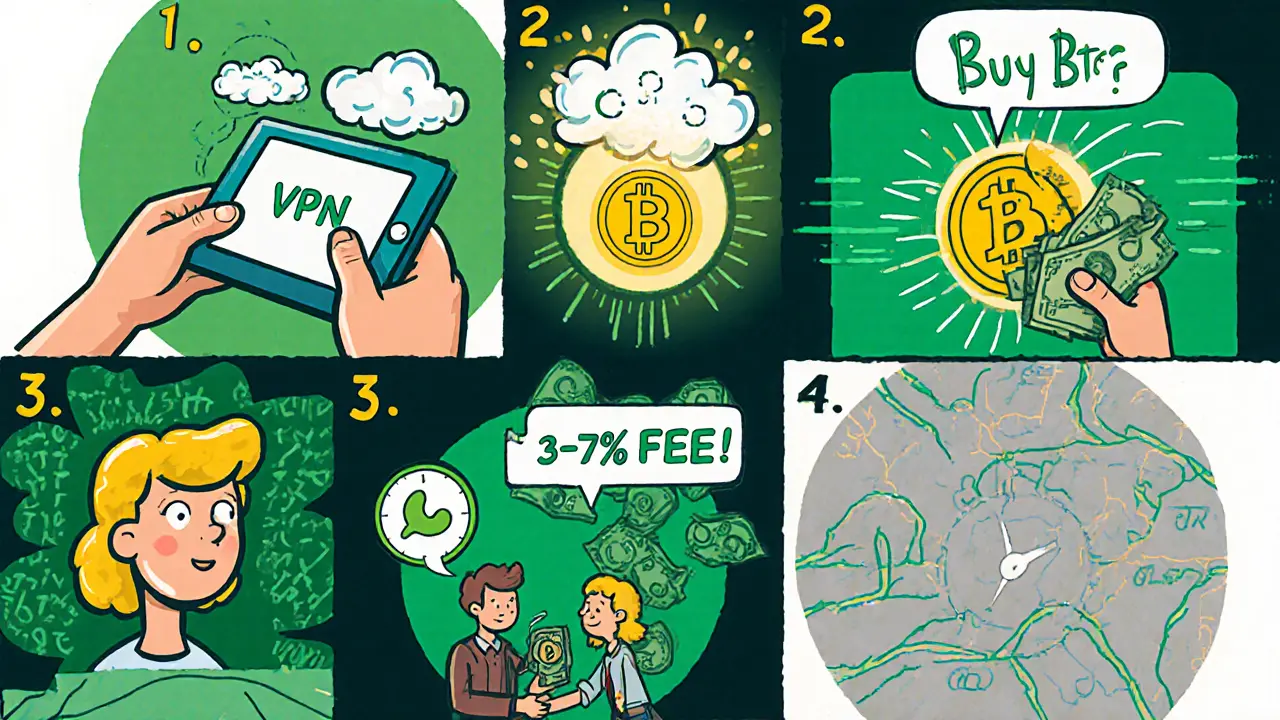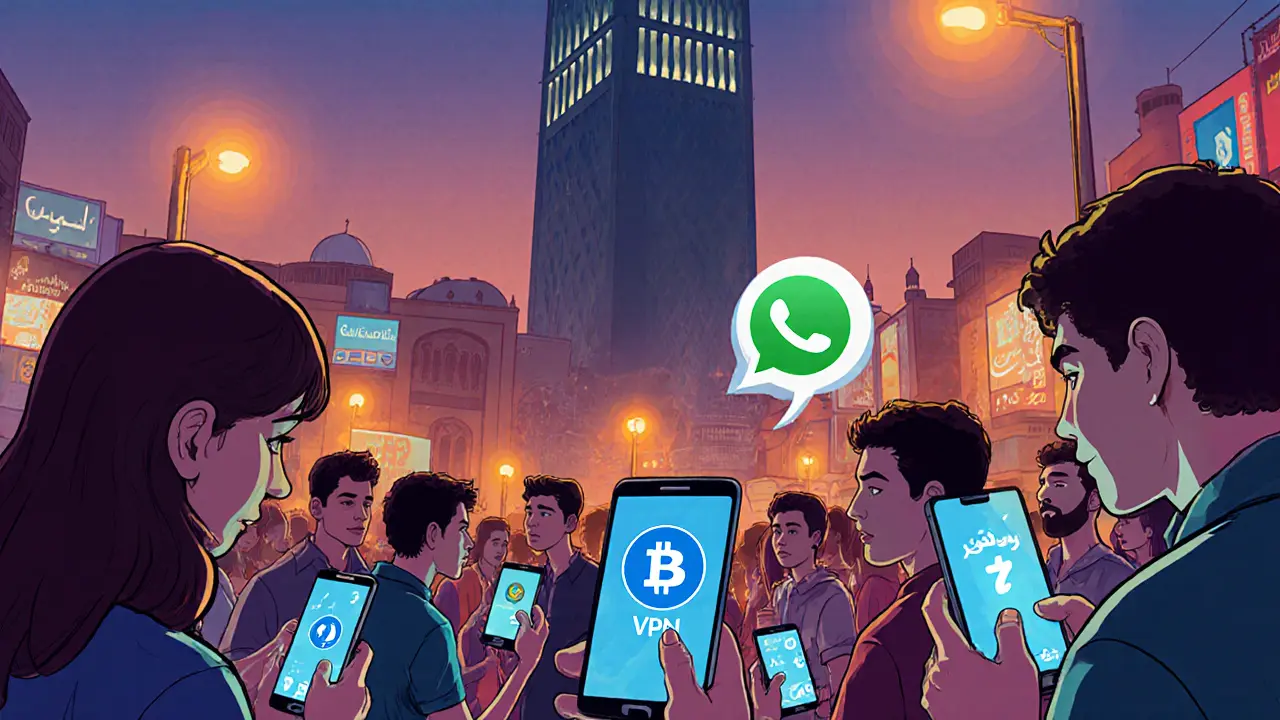Moroccan Crypto Transaction Cost Calculator
How It Works
Current underground market: 3-5% transaction fees with 48-72 hour settlement times.
Proposed regulated market: 0.5-1% fees with instant settlement.
Results
Key Takeaways
- The 2017 ban has not stopped Moroccans from using crypto; an estimated 1.2 million people trade underground.
- Mobile‑first peer‑to‑peer networks and VPNs power most transactions, with Bitcoin handling 57% of volume.
- Transaction fees are 3‑5 % and settlements can take up to three days, far higher than regulated markets.
- Since 2024 the government is drafting a regulatory framework that could legalize exchanges but will keep crypto out of commercial payments.
- Analysts expect the market to grow 35‑40 % once the draft law is enforced, potentially hitting $292 million by 2026.
When Morocco’s central bank slapped a ban on all crypto activity in November 2017, many thought the market would vanish. Fast forward to 2025, and the underground scene is booming. How did a law meant to protect monetary sovereignty end up fueling a hidden digital economy?
Morocco cryptocurrency ban is a legal restriction announced by the Moroccan Exchange Office and Bank Al‑Maghrib that declared Bitcoin, NFTs, mining, DeFi and even central‑bank digital currencies illegal. The official rationale highlighted four worries: loss of monetary sovereignty, threats to central‑bank authority, illicit‑activity risk, and consumer‑protection gaps.
Yet, underground adoption kept climbing. Industry analysts at AInvest estimate that about 1.2 million Moroccans - roughly 3.2 % of the population - have engaged with crypto between 2018 and 2024. The market’s value is projected at $278.7 million for 2025 and $292.4 million for 2026, according to The Paypers.
Why the Ban Failed to Stop Users
Three factors explain the resilience of the crypto community:
- Cell‑phone dominance: Over 80 % of users access international exchange apps like Binance, Bybit or OKX through VPNs.
- Social‑media coordination: Roughly 68 % of trades are organized in WhatsApp groups or Telegram channels, creating a trust‑based web of local intermediaries.
- Remittance demand: With a diaspora spread across Europe and the Gulf, many rely on crypto to receive faster, cheaper cross‑border payments.
These adaptations make the underground market distinct from a typical black‑market operation. Users treat crypto as a parallel financial system, not a fleeting hobby.
How the Underground Market Works
Imagine you want to buy Bitcoin. First, you download a VPN, connect to a server outside Morocco, and open the Binance app. You then post a request in a local WhatsApp group. An “intermediary” - often a trusted friend who already has a verified Binance account - matches you with a seller. The seller sends the crypto to the intermediary’s wallet, the intermediary confirms receipt, and you pay the seller in cash or via a local bank transfer. The whole cycle can span 24‑72 hours, and each step adds a fee of 3‑5 %.
Stablecoins like USDT have become popular because they limit volatility while still enabling fast cross‑border moves. The Paypers reports that USDT accounts for 15.8 % of underground volume, second only to Bitcoin (57.3 %).
Risks and Real‑World Stories
Operating off the radar carries danger. On Reddit’s r/CryptoMorocco, users share both wins and losses. One trader, u/CryptoDarija, posted:
“I’ve traded 147 times via local OTC groups over 3 years - made 22,000 MAD profit but lost 3,500 MAD in one scam when the seller vanished after payment.”
Lightspark’s 2025 compliance analysis shows that 32 % of participants have faced fraud attempts, while 27 % report payment delays beyond four days. Trust‑building is a long process - about eight weeks on average before a newcomer feels safe.

Economic Impact: Numbers That Matter
Even underground, the market moves big money. Transaction volume grew at a 19.7 % CAGR from 2018 to 2024. Monthly values rose from $8.2 million in early 2018 to $47.6 million by mid‑2024. The average transaction fee, however, is ten times higher than in regulated exchanges.
Demographically, the activity concentrates in urban centers (83 % in cities over 500k residents), among young adults (68 % aged 18‑35) and higher earners (72 % earning above MAD 10,000 per month). International remittances dominate use cases (44 % of trades), followed by speculative trading (31 %) and cross‑border e‑commerce (17 %).
Government’s Shift: From Ban to Draft Regulation
In November 2024, Bank Al‑Maghrib’s governor Abdellatif Jouahri signaled a policy pivot: a draft law aiming to regulate crypto is on the table. The proposed framework includes five core pillars:
- Mandatory AML/CFT reporting and KYC verification for all transactions.
- Licensing of exchanges by Bank Al‑Maghrib (application costs MAD 150,000‑200,000).
- A 15 % capital‑gains tax on crypto profits.
- Oversight of ICOs and security tokens by the Moroccan Capital Market Authority (AMMC).
- Continued prohibition of crypto for commercial payments - businesses must still use traditional banking channels for trade.
Professor Fatima Zahra El Moudni of Mohammed V University explained that the shift acknowledges “the ban has failed; underground activity grew 140 % since 2017 while exposing consumers to higher risks.” Bank Al‑Maghrib’s internal 2024 assessment found that actual crypto‑related crime rates were far lower than feared - only 4.3 % of reported financial crimes involved crypto.
What Regulation Could Mean for Users
If the draft law takes effect in Q3 2025 as planned, we can expect several changes:
- Lower fees: Licensed exchanges could bring transaction costs down to under 1 %.
- Faster settlements: On‑chain withdrawals would no longer need multi‑day OTC routing.
- Increased consumer protection: AML/KYC checks aim to cut fraud, though they also introduce privacy concerns.
- Tax compliance: Users must report gains, which could deter speculative trading.
Analysts predict a 35‑40 % market expansion within 18 months of regulation, potentially pushing the sector past $300 million. At the same time, risk exposure could drop by an estimated 62 % thanks to formal oversight.

Comparison: Underground vs. Regulated Crypto Market (Morocco)
| Aspect | Underground (2025) | Regulated (Projected) |
|---|---|---|
| Average fee | 3.8‑5.2 % | 0.5‑1 % |
| Settlement time | 48‑72 hours | Minutes (on‑chain) |
| Legal risk | 9 % report threats | Low (licensed) |
| Access method | VPN + WhatsApp/Telegram | Direct exchange apps (KYC) |
| Primary use case | Remittances & speculation | Remittances, investment, fintech services |
Practical Tips for Anyone Still Going Underground
If you’re navigating the hidden market today, here are three must‑have tools:
- Reliable VPN: NordVPN or ExpressVPN (MAD 120‑180 per month) to bypass geo‑blocks.
- Trusted local intermediary: Build relationships in WhatsApp groups of 50‑200 members; verify reputation over several small trades first.
- Secure wallet: Use a hardware wallet or a non‑custodial app with multi‑signature support to protect assets.
Expect a learning curve of about eight weeks before you feel comfortable spotting scams and negotiating fair spreads (typically 4.8‑7.2 %). Remember, the biggest hazard isn’t the technology - it’s trusting the wrong counter‑party.
Looking Ahead: Morocco as a North‑African Fintech Hub
Finance Minister Nadia Fettah Alaoui announced in July 2025 that Morocco aims to become “a regional fintech hub.” The draft regulation is the first step toward that vision. If the framework balances innovation with consumer safety, the kingdom could attract startups, create jobs, and tap into the already‑active underground talent pool.
Until the law rolls out, the paradox will persist: a formal ban on paper and a thriving digital economy in practice. For observers outside Morocco, the lesson is clear - heavy‑handed prohibition rarely eliminates demand; it merely pushes it underground, where it becomes harder to monitor but also more resilient.
Why did Morocco ban cryptocurrencies in 2017?
The ban aimed to protect monetary sovereignty, prevent capital flight, guard the central bank’s authority, curb potential money‑laundering, and address consumer‑protection gaps.
How many Moroccans are using crypto despite the ban?
Industry analysts at AInvest estimate about 1.2 million people - roughly 3.2 % of the population - have engaged with crypto between 2018 and 2024.
What are the main ways Moroccans trade crypto underground?
Most rely on mobile VPNs to access international exchanges, then coordinate trades through WhatsApp or Telegram groups, using local intermediaries for fiat on‑ramps and off‑ramps.
Will the upcoming regulation legalize crypto exchanges?
Yes. The draft law plans to issue licenses for exchanges, require AML/KYC compliance, and tax capital gains, but it will keep crypto out of commercial business payments.
What risks remain for users after regulation?
Even with licensing, users will face KYC scrutiny, a 15 % capital‑gains tax, and possible account freezes if they breach AML rules. Privacy concerns and the need to adapt to formal processes are also new challenges.

BRIAN NDUNG'U
June 4, 2025 AT 21:28It is noteworthy how the Moroccan populace has demonstrated resilience in the face of regulatory constraints. The data presented underscores a clear trend toward decentralized financial autonomy, a phenomenon that merits scholarly attention. While the governmental ban intended to safeguard monetary sovereignty, the empirical evidence suggests an inadvertent catalysis of underground activity. Stakeholders should consider the implications for policy formulation, particularly regarding the balance between oversight and innovation. Ultimately, this underscores the importance of adaptive regulatory frameworks that evolve alongside technological advancement.
Donnie Bolena
June 4, 2025 AT 23:41Wow, this is absolutely fascinating!!! The sheer scale of underground crypto usage in Morocco is mind‑blowing!!! It shows that people will always find a way when they see value!!! I love how the article highlights the role of mobile‑first solutions and VPNs – such clever workarounds!!! Let's keep watching this space, because the upcoming regulations could unlock even more potential!!!
Elizabeth Chatwood
June 5, 2025 AT 01:38im super impressed by how many folks still trade despite the ban its like a whole secret club out there lol the vpn hack is real and the whatsapp groups sound like a tight community keep it up
Tom Grimes
June 5, 2025 AT 04:08Reading through the whole piece feels like walking down a maze of hidden corridors; each paragraph reveals another twist in the tale of Moroccan crypto rebels. First, there is the sheer audacity of ordinary citizens downloading a VPN in the dead of night, just to slip past the digital border that the state erected. Then, they flood into WhatsApp groups, where trust is built on a series of small trades, each one a test of loyalty and integrity. The intermediaries act like old‑school brokers, matching buyers and sellers in a dance that can stretch from a single day to three whole days, each step adding a new fee, a new layer of complexity. Imagine the anxiety of waiting for a confirmation that the crypto has landed in the intermediary’s wallet while you hold cash in your hand, hoping the other side won’t vanish. The article mentions a 22,000 MAD profit; that’s the kind of windfall that keeps people coming back, even after a loss of 3,500 MAD from a scam that left a scar. The risk of fraud is real – 32 % of participants have faced it – yet the community persists, learning to spot red flags, building reputations over weeks, sometimes months. It's a social contract built on reciprocity, an underground economy that mirrors the formal one but operates in the shadows, where every transaction is a whisper. The reliance on stablecoins like USDT shows a maturation; people want less volatility while still enjoying the speed of blockchain. When you think about it, the average transaction fee of 3‑5 % is a price paid for anonymity and accessibility, a tax of secrecy that most regulated markets simply don’t levy. The fact that the government is now drafting a regulatory framework is both a sign of recognition and a potential threat – will the same community that survived a ban now be forced into the light? If the new rules bring fees down to under 1 % and settlements within minutes, the whole dynamic could shift dramatically, making the underground market less attractive. Yet, there will always be a segment that values privacy over convenience, a core of crypto enthusiasts who will keep the VPNs humming. In the end, this story is a testament to human ingenuity: when a law tries to close a door, people find a window, then build a whole new house behind it.
Paul Barnes
June 5, 2025 AT 05:48Sure, the ban looks like a government ploy, but under the surface it's just a way to keep the masses blind to who's really pulling the strings.
John Lee
June 5, 2025 AT 08:01What a vivid snapshot of a community turning adversity into opportunity! The blend of tech‑savvy hustle and heartfelt remittance stories paints a picture that's both gritty and hopeful. It’s fascinating how mobile‑first mentalities intersect with age‑old trust networks-WhatsApp becomes the modern bazaar. As the draft regulations loom, I wonder how much of this grassroots resilience will survive the shift to formal licensing. Either way, the Moroccan crypto scene is a living lab for decentralized finance in action.
Jireh Edemeka
June 5, 2025 AT 09:25Funny how the authorities claim they’re protecting us, yet the real protection comes from the very people they banned. I’m not saying it’s perfect, but at least the community watches each other’s backs-something the state clearly can’t manage.
del allen
June 5, 2025 AT 10:31Wow, this article really hits home 😊👍. I know a few friends who use VPNs to trade, and they always stress how important trust is in those WhatsApp groups. Stay safe out there, fam! 🌍💪
Jon Miller
June 5, 2025 AT 12:36Seriously, the drama of a crypto deal that takes three days feels like a thriller! Who needs Netflix when you’ve got Moroccan OTC swaps? The suspense of waiting for that confirmation is next‑level.
Rebecca Kurz
June 5, 2025 AT 14:25Everything is a setup!!! The ban was never about money‑laundering; it's about control-keep the people on a leash, and the real money flows stay invisible!!!
Nikhil Chakravarthi Darapu
June 5, 2025 AT 15:15While we cheer about the underground hustle, let’s not forget that national sovereignty must be protected. Foreign crypto platforms are nothing but tools of economic colonisation; Morocco needs its own regulated ecosystem to safeguard our heritage.
Tiffany Amspacher
June 5, 2025 AT 16:05Ah, the labyrinthine narrative of the long‑winded saga! One could argue that such verbosity mirrors the very complexity of the underground market-layers upon layers of trust, risk, and hope. Yet, in the end, the story is simple: humanity's yearning for financial freedom persists, no matter the length of the tale.
Lindsey Bird
June 5, 2025 AT 16:55Drama? More like a soap opera. People trade crypto like they're exchanging love letters, and then they get heartbroken over a missing satoshi. The stakes are high, but the hype is higher.
john price
June 5, 2025 AT 17:45Talk is cheap, but data is king. The numbers don’t lie: 1.2 million users, 57 % Bitcoin volume, and fees dragging everyone down. If the state really wants to curb this, they need to address the root-access, not punishment.
Ty Hoffer Houston
June 5, 2025 AT 18:35Great insights all around! It’s clear that Morocco’s crypto journey reflects a global tension between innovation and regulation. Let’s hope the upcoming framework finds a balanced path that protects users while nurturing growth.